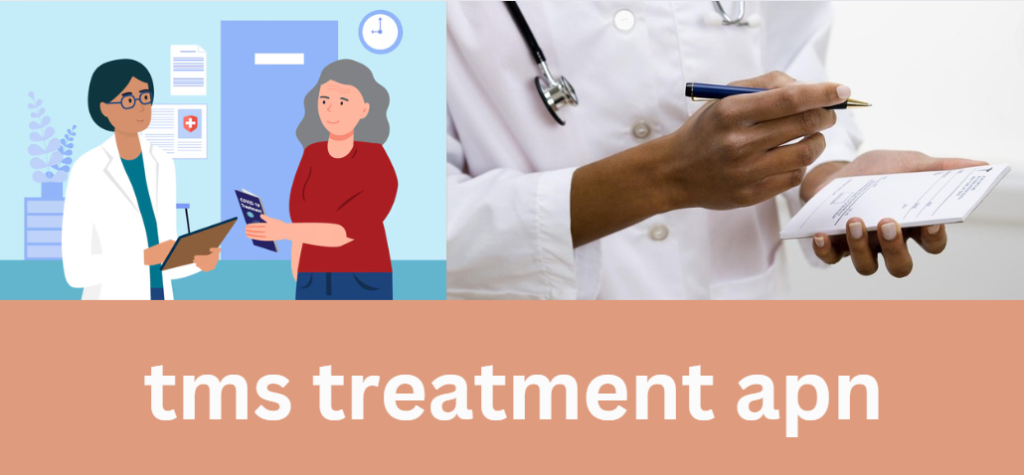Transcranial Magnetic Stimulation (TMS) has emerged as a revolutionary treatment for various mental health conditions, offering hope where traditional therapies might fall short. The term “TMS treatment APN” reflects a growing interest in Advanced Practice Nurses (APNs) who are specializing in administering this innovative treatment.
In this article, we will explore the ins and outs of TMS treatment, the role of APNs in this field, and how this therapy can benefit individuals suffering from conditions such as Major Depressive Disorder (MDD), Obsessive-Compulsive Disorder (OCD), anxious depression, late-life depression, and smoking addiction.
Contents
What is TMS Treatment?
Overview of TMS Therapy
Transcranial Magnetic Stimulation (TMS) is a non-invasive procedure that uses magnetic fields to stimulate nerve cells in the brain. It’s primarily used to treat mental health conditions by targeting specific areas of the brain associated with mood regulation and cognitive functions.
The FDA-approved treatment involves placing an electromagnetic coil on the patient’s scalp, which generates magnetic pulses. These pulses penetrate the brain’s outer layers and induce small electrical currents that stimulate nerve cells, potentially improving symptoms of depression and other conditions.
How TMS Works
- Magnetic Pulses: TMS involves sending magnetic pulses to specific brain regions. These pulses are thought to activate brain cells and improve communication within neural circuits that are impaired in depression and other mental health disorders.
- Session Details: Each TMS session typically lasts about 20 minutes. The treatment is administered in a clinical setting, and there is no recovery time required before patients can resume their daily activities.
- Safety and Efficacy: TMS is considered safe with minimal side effects. Common side effects include mild headache or discomfort at the site of the coil. It’s a non-invasive alternative to medications and other therapies.
The Role of APNs in TMS Treatment
What is an Advanced Practice Nurse (APN)?
Advanced Practice Nurses (APNs) are registered nurses with advanced education and training in a specialized area of healthcare. They include Nurse Practitioners (NPs), Clinical Nurse Specialists (CNSs), Nurse Anesthetists (CRNAs), and Nurse Midwives (CNMs). APNs are equipped with advanced clinical skills, enabling them to provide high-quality care, including the administration of specialized treatments like TMS.
APNs and TMS Therapy
- Training and Certification: APNs specializing in TMS therapy undergo extensive training to become proficient in administering the treatment. They must be knowledgeable about the technology, patient selection criteria, and the therapeutic protocols involved.
- Patient Care: APNs play a crucial role in evaluating patients for TMS therapy, ensuring they meet the criteria for treatment, and monitoring their progress throughout the course of therapy. Their expertise helps tailor the treatment to individual needs and manage any potential side effects.
- Coordination with Other Healthcare Providers: APNs often work as part of a multidisciplinary team, coordinating with psychiatrists, psychologists, and other healthcare professionals to ensure comprehensive care for patients undergoing TMS therapy.
Conditions Treated with TMS
Major Depressive Disorder (MDD)
Major Depressive Disorder (MDD) is a severe form of depression characterized by persistent sadness, loss of interest in activities, and a range of physical and emotional symptoms. TMS has been shown to be effective in treating MDD, especially in patients who have not responded to traditional treatments like medication or psychotherapy.
Obsessive-Compulsive Disorder (OCD)
Obsessive-Compulsive Disorder (OCD) involves persistent, intrusive thoughts (obsessions) and repetitive behaviors (compulsions) that interfere with daily life. TMS therapy can help reduce symptoms in individuals with OCD by targeting brain areas involved in the disorder’s pathology.
Anxious Depression
Anxious Depression combines symptoms of depression with heightened anxiety. This condition can be challenging to treat with standard therapies. TMS offers a promising alternative for individuals with anxious depression, providing relief from both depressive and anxious symptoms.
Late-Life Depression
Late-Life Depression refers to depression occurring in older adults, which can be particularly challenging due to age-related factors and comorbid conditions. TMS has been shown to be effective in older adults, offering a non-invasive treatment option that does not interfere with other medications or health conditions.
Smoking Addiction
Smoking Addiction is another area where TMS is being explored. The therapy aims to reduce cravings and withdrawal symptoms associated with smoking cessation. Although research is still ongoing, initial studies suggest that TMS may help support smoking cessation efforts.
Benefits of TMS Therapy
Non-Invasive Treatment
One of the significant advantages of TMS therapy is that it is non-invasive. Unlike surgeries or certain other treatments, TMS does not require any incisions or anesthesia, making it a more accessible option for many patients.
Minimal Side Effects
TMS is generally well-tolerated, with minimal side effects. Common side effects are mild and temporary, such as headaches or discomfort at the site of the coil. This makes TMS a viable option for patients who may be sensitive to the side effects of medications.
No Recovery Time
Patients can resume their daily activities immediately after a TMS session. There is no downtime or recovery period required, allowing individuals to integrate the treatment into their regular routine without significant disruptions.
Effective for Treatment-Resistant Conditions
For individuals who have not responded to traditional treatments, TMS offers a new avenue for relief. It can be particularly beneficial for patients with treatment-resistant depression or other conditions where conventional therapies have proven inadequate.
How to Prepare for TMS Treatment
Initial Consultation
Before starting TMS therapy, patients will undergo an initial consultation with an APN or a healthcare provider to determine if TMS is appropriate for their condition. This involves a thorough assessment of their medical history, current symptoms, and previous treatments.
Treatment Plan
If TMS is deemed appropriate, a personalized treatment plan will be developed. This plan will include the number of sessions required, the frequency of treatments, and specific protocols tailored to the patient’s needs.
During Treatment
During each TMS session, patients will sit comfortably while the electromagnetic coil is placed on their scalp. They may feel slight tapping or buzzing sensations, but the procedure is generally well-tolerated.
Post-Treatment Care
Following each session, patients can return to their normal activities without any restrictions. Regular follow-up appointments will be scheduled to monitor progress and adjust the treatment plan as needed.
Common Questions About TMS Treatment
What conditions can TMS treat?
TMS is primarily used to treat Major Depressive Disorder (MDD), Obsessive-Compulsive Disorder (OCD), anxious depression, late-life depression, and smoking addiction. It has also shown potential in treating other conditions, although research is ongoing.
How long does a TMS session last?
Each TMS session typically lasts about 20 minutes. The frequency and total number of sessions will vary depending on the patient’s condition and response to the treatment.
Are there any side effects associated with TMS?
TMS is generally well-tolerated with minimal side effects. Common side effects include mild headaches or discomfort at the site of the coil. These side effects are usually temporary and resolve shortly after the session.
How many TMS sessions are required?
The number of TMS sessions required varies based on the individual’s condition and response to treatment. Typically, patients undergo daily sessions over several weeks, but the exact duration and frequency will be tailored to the individual’s needs.
Is TMS covered by insurance?
Insurance coverage for TMS therapy varies depending on the provider and the patient’s plan. It’s important to check with your insurance company and healthcare provider to determine coverage and any potential out-of-pocket costs.
Conclusion
TMS treatment APN represents a significant advancement in mental health care, offering an effective, non-invasive option for individuals suffering from various conditions. By understanding the role of Advanced Practice Nurses in administering TMS, the benefits of the treatment, and how it can help with conditions like Major Depressive Disorder, OCD, and smoking addiction, individuals can make informed decisions about their mental health care.
This comprehensive guide provides valuable insights into TMS therapy, emphasizing its efficacy, safety, and role in modern mental health treatment. Whether you’re considering TMS therapy for yourself or seeking information to help someone else, understanding the intricacies of “TMS treatment APN” will help you navigate this innovative treatment with confidence and clarity.



